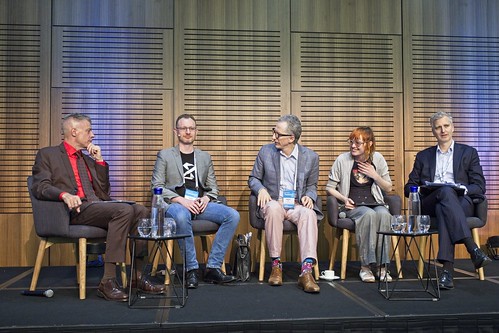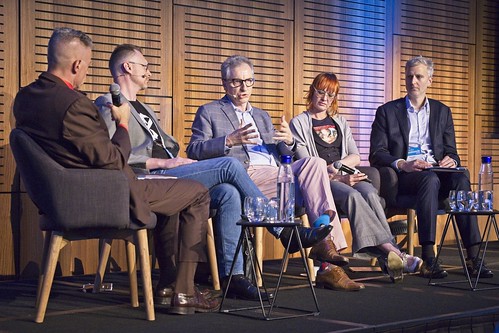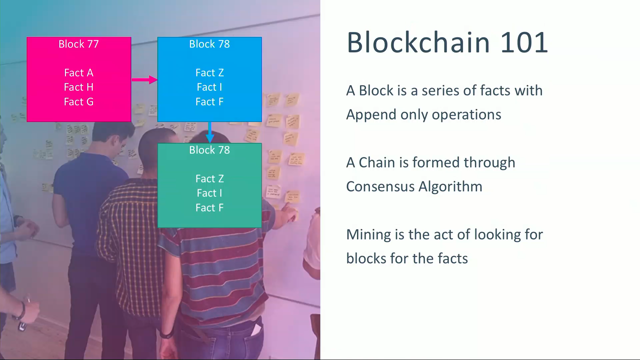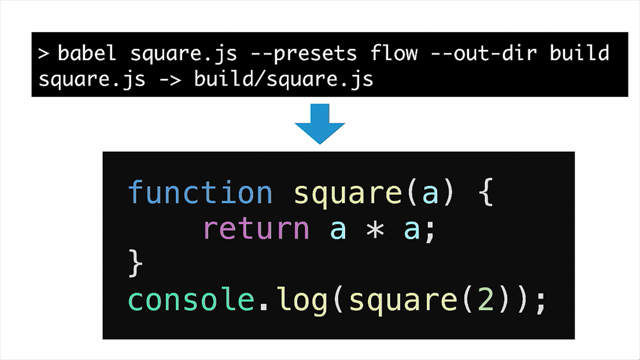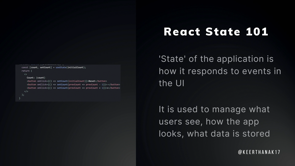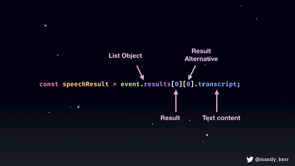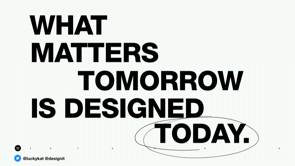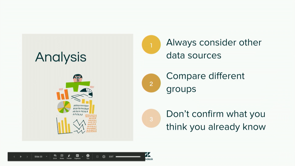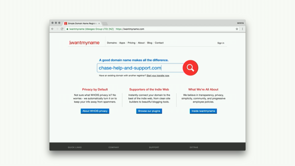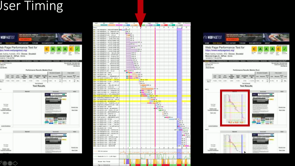
(retro electronic music) (audience applauds) - Thank you, John.
We'll try to live up to this, and hopefully, this will not be a horrible experience.
But because it is Halloween today, and because I've dressed as Satanically as I dare, (audience laughs) let me begin with a recent tale from the crypt. And I quote, "We believe that many more people "should have access to financial services and cheap capital. "We believe that people have an inherent right "to control the fruit of their legal labour. "We believe that global, open, instant, "and low-cost movement of money will create immense "economic opportunity and more commerce around the world. "We believe a global currency and financial infrastructure "should be designed and governed as a public good." Do we really believe any of that? Okay, I suppose, yeah, we do.
Here in Australia, we never really think about access to the financial system.
We are a very rich nation.
Pretty much everyone here has a bank account. Most people have credit cards.
There's a growing number of merchants who will only accept digital payments.
And so it's actually easy to imagine being cut out of the economy, just by missing a payment. Now, if you take that problem and you multiply it by three billion, you begin to see the vast gap between the less than one billion of us who have credit cards and the more than four billion of us who have smart phones. It's a problem because more than half of humanity has the perfect tool for trading, but they can't. Now, into that gap between what we should be able to do and what we can actually do, this guy, yeah.
He's all about the sharing. (Mark laughs)
Sharing has made him a billionaire, and money, that's just another thing to share. And sharing money, if he gets sharing money right, he's a trillionaire.
And you know, he's not the only one with this idea. Last week, Xi Jinping got his rubber stamp legislature to pass a law that will bring the benefits of blockchain to China, starting with a digital yuan.
Now, the idea of a digital currency isn't new. 11 years ago today, Satoshi Nakamoto dropped the Bitcoin white paper on a world that was tottering at the edge of financial catastrophe. That was the deepest moment of the GFC, and it changed nothing at first.
And now, 11 years later, it's changing everything. We are at a really interesting moment.
In the six weeks between Facebook's launch of its Libra digital currency on the 18th of June and the People's Bank of China announcement of its soon to be released digital yuan, we passed a point of no return.
A digital currency is coming, like it or not, probably several of them.
Each digital currency will have its own features and its own costs.
And that is the whole point of the next 40 minutes, because we now have to think about how we put this new money to work.
It's a question a lot of folks will be asking over the next few years, a lot of folks in this room.
And so this is a good time to have a good thing. And as John said, we've gathered an incredibly expert panel, each of whom has specific expertise in one aspect of this very new, very exciting, very terrifying and paradoxical world of new money.
So let's begin.
So, over on the far side of the panel, Damian Jeffree, director of Soveren.
Now, Damian, pretty much every country in the world has a currency. Isn't that enough, just to start with? - Unfortunately, Mark, that's actually probably most of the problem, is that there's 162 currencies in the world, or thereabouts. That's the nation state currencies.
These create barriers to trade and investment. They create barriers to financial services. And the problem is we just don't have a design system. We used to have a design system.
So, after World War II, there was a thing called the Bretton Woods Conference, and we designed a system.
Now, we made some mistakes in the design, one in particular called the Triffin dilemma, which meant that that system was never going to last. The US had to, in theory, keep producing gold to back global growth, and that was just not possible. But what happened when that system finally fell apart after the social spending of the 60s and the Vietnam War was that we ended up with an undesigned system. So Nixon closed the gold window and kind of just let the rest of the world sort itself out. This is not an ideal way to design, or, it wasn't even a design process, to create an international monetary order.
And unfortunately, that's where we are at the moment. Now, during the Bretton Woods era, we had 25 years of extremely low banking crises and the currency system worked quite well.
And this is exactly what developing countries need, stable finances.
It's absolutely essential.
- [Mark] And this is exactly what many developing countries don't have.
- They don't have.
And the problem is the current system relies on countries being trustworthy, having central banks that everybody has faith in, having not too much corruption.
For large economies, this is the post-Bretton Woods system, which we can call 1971 onwards, has been fantastic, 'cause we're given incredible monetary flexibility. But for smaller economies, it hasn't been a great deal. That's why we've got the Venezuelas of the world. People can't rely on their government; therefore, they can't rely on the central bank. They can't rely on their currency.
It's a bad design.
- And in fact, one of my friends recently gave me a 10 billion dollar Zimbabwe bill a couple of weeks ago, which she told me, when she bought it online, she actually couldn't pay money for it, because then it would have been a currency transition, and it would have been covered by anti-money laundering laws.
So it actually had to be given as a gift.
All right, Annmarie Forsstrom is a software developer, passionate open-source advocate, has spoken at this conference before.
Now, Annmarie, Aimee Maree, oh my God.
I kept on thinking I was gonna do that, my apologies. Aimee Maree, you have done work in digital payments in the developing world.
What do digital payments bring to economies that don't have the sophisticated payments infrastructure that we have, say, here in Australia? - Yeah, so I guess to take on from what Damian was talking about is, you know, we sit here in Australia, and if I mentioned the ideas of branchless banking or virtual banking, it'd be interesting to see what comes from the audience.
Most of us have grown up with this kind of, I guess, expectation that we have a branch down the road from us. That doesn't actually, that's a luxury that doesn't exist in most countries.
And the other thing is actually having a bank account. So the M-Pesa, which is a digital currency that was developed in Kenya, was backed by Vodafone, which is the reason why it took off to the size it did. Now, that was in 2007, so it was slightly before Satoshi's famous paper. It is now used in 10 countries, and I think it's hitting about a 30 million userbase. So to give you an idea, that's roughly the size of the population of Australia.
What it enables is for the M-Pesa, for example, companies would partner with them, and they would go through Safaricom as the backup, and what that means is myself, let's just say I'm a mother, and I wanted to hand some money or do some work for my children or pay for some things.
I actually don't need to have an account with a bank. I can have an account that runs on my phone, and then all payments are done via the SIM card. Now, estimations have, there was some interesting paper that said roughly around two percent of Kenyans have been lifted out of poverty with this.
Of course, it's always interesting how those statistics are gathered, but definitely, it changed the movement of money on the ground, because all of the sudden, you didn't need to rely on going to have these big banking accounts, which wasn't the easiest thing, especially for a lot of people who aren't as, you know, who aren't as proficient in not just English, like language skills, things English skills, right, language skills, but also finance skills. So it just enabled them, with this one phone, they can now make those payments.
They can buy things like mobile phone credits and hand that onto their children to use.
So it really kind of changed the way the banking was done. And so if you think of that, and you think of just how, in that amount of time, we've got 30 million users there, and then we talk about something like a Facebook currency. - [Mark] With two billion users.
- Yes, and a lot of those users, we think, not everybody's like us. (Aimee laughs)
Most people aren't in the world, actually.
So, for a lot of those two billion users, they won't have a banking system.
So, an offering of a way to make easy transferring payments. - [Mark] Is incredibly alluring.
- It's, yeah, and it can be really, really freeing for a lot of people in those positions.
- All right, now before we go onto our next panellist, we have to realise we're actually talking about two levels here. There's microeconomics, which is me handing you a five dollar bill, and how I might do that, all the different ways I could do that.
There's also macroeconomics, which is how money flows through an economy and how it moves between economies, balance of payments, things like this.
Now, fortunately, as one of Australia's most influential economists, Nicholas Gruen is across both the micro and macroeconomic aspects of money. So Nicholas, if we're about to get a whole bunch of very new, very slippery digital currencies, what do we get if that goes well? - Well, we get microeconomic miracle worker and a macroeconomic wrecking ball.
So take your pick.
(audience laughs) - Can I just pick one? - No. - All right, so unroll those.
Why is it good microeconomically and bad macroeconomically? - So, the most fundamental thing, and I think the web community, the digital community don't understand this well enough, and economists don't understand this well enough, is this: that since the internet came about, we have a reordering of the relationship between public and private goods. And we think, following economists, that private goods are provided by the market and public goods are provided by government. But you just gave us an example of a public good which isn't provided by government.
Facebook is a public good provided by a private body. And one way of talking about the state of affairs that the world has got itself into right now, before we even talk about money, would be to say that we have been gorging on the microeconomic beauty and wonder of the internet and the collapse of transactions costs, and guess what's happened to our politics? Because our culture works in such a way that culture is transaction costs.
- So if you lower those, you change the nature of the culture that it's sitting on top of. - Absolutely, and what has happened is that, in trying to make as much money as they can, and we live in a culture in which that's not a bad thing. Most people are trying to do that.
I'm not really trying to demonise them.
But in trying to do that, they're destroying our culture. They're destroying our politics.
It wasn't too great before the started, because media itself was destroying our politics, when you think that presidential sound bytes in the United States, when the internet was just a glint in Vint Cerf's eye, fell from 46 or 47 seconds to eight seconds from 1968 to 1988.
So enough damage has been done by that fact, and now, bang. So what was the big word of Silicon Valley 15 years ago? Scale. - Scale.
- Scale, because you build this incredible thing, plug it into the internet.
Bang, you've got scale.
Money gets built from the bottom up, and there are people who wanna scale it.
I'm not arguing for or against it.
I'm just trying to explore its dimensions.
We're looking at a very similar set of dilemmas, and we're actually gonna see this stamped all over all of the places that the digital revolution is going. - Okay, so lemme introduce Samuel Brooks, CTO for Block8, which is a blockchain venture studio based here in Sydney. Now, Sam, we should note, today is the 11th anniversary of Bitcoin.
It's here, it's a big deal.
It's not the peer-to-peer payments solution that it was supposed to be, that Satoshi Nakamoto was supposed to sort of propose, probably because it's slow.
It takes 20 minutes to settle the transaction. You can't wait at the till 20 minutes for your transaction to settle.
So, how do these new digital currencies, Libra and the digital yuan, how do they get around this? How are they different? - So, distributed system design is an exercise in trade-offs, and it's interesting talking about scale with the internet, because that typically refers to the propagation of data, the propagation of information, which, in the Web 2.0 sense is generally a very good thing; you wanna share. But when it comes to the money, that's not necessarily something you wanna copy, because the value would collapse.
So, with designing these systems and thinking about the trade-offs, it's always a question of trading off trust and performance. So, with Bitcoin, we have two key performance issues. One is that it's slow, as we mentioned, because of the security constructions around that. But the other issue, performance issue with Bitcoin is that it's also incredibly volatile.
So when it comes to using it as a form of money or as a unit of account, it doesn't really function very well, because we can't predict its value. - Well, you're always taking foreign exchange risk, right? It's like dealing in a currency in a crazy economy that's currently going up and down.
- Right. - Like the pound.
(panellists laughing) - Wonder why that would be.
That's kind of the other part of the system. The politics has gone haywire.
- Yeah, yeah.
- So the way Libra and other currencies have sought to fixed Bitcoin is simply to reorganise the set of trade-offs, effectively be injecting more trust into the system. So when it comes to the speed question, instead of an open system where anybody can participate in consensus, they have a fixed number of known participants, and that resolves in an alternative consensus from proof of work. They use a consensus mechanism called HotStuff. And we get a three- to four-second finality, which is a lot better than 20 minutes.
- Not different from FBOSS, really.
- Yeah.
I think with these systems, you wanna aim for about, under four seconds, because more than that. - People get cranky at the till.
- Breaks your use cases, exactly.
So it's a trusted consensus mechanism.
That's how they get around the speed issue. In terms of stability, they have a token which is stable in value, so it's a unit of account called the Libra. The way they manage its stability is in a couple of ways. First of all, it's not fixed in amount.
So, the amount of Libra in circulation fluctuates according to how many Libra are injected or removed from the system, unlike Bitcoin, which is fixed in amount and therefore is able to be fluctuated in value. - So it's like letting air in and out of a balloon in order to keep it at the same level of inflation relative to air pressure outside, then.
- Yeah, which is able to be done more easily with a semi-trusted system, because you have permissioned actors able to pull those knobs and levers to affect that. Something like Bitcoin is a lot more static in terms of its monetary policy, and that's not something that Bitcoin can actually achieve. The other thing keeping Libra stable is that it's backed, it's fully backed by a set of relatively stable assets, things like government bonds and relatively stable currencies.
And the Libra token effectively acts as a depositary receipt, a claim on that.
- Right, so it's like you're buying a share in this fund, this mutual fund of all of these currencies. - Yeah. - Okay.
So clearly, it's doable.
Small countries in particular need good currencies. They need good digital currencies, because this is important to them.
Microeconomically, we need it; macroeconomically, it might be the ruin of all of us. But we know that it's also now technically possible. We've established all of that.
So now it's time to start to ask some questions about design. What do we absolutely need to get right when we're designing a digital currency, and what do we absolutely need to avoid at all costs? I mean, the money and the design of the money, and the design of the tools that people will be using, because it's possible to hand someone a really sophisticated tool that's more sophisticated than their own capacity, which then basically fleeces money out of them. We see that happening in sophisticated economies. - Yeah, well, I can start with the responding. I mean, money, you've gotta think, sits at the base. Everything in the financial system builds on top of that money layer and is reliant on it. So the risk appetite, and certainly at central banks, this is the case, the risk appetite is basically zero. So things have to be extremely secure, like, secure beyond what you think is okay for being secure. Like, secure in a way that is almost an absolute, and then on top of that, it also has to be stable, and we talked about it in terms of value terms. So you have to have that sure base to build on, and the risk level has gotta be acceptable to build an entire global economy on.
- [Mark] At some level, I mean, at the microeconomic level, it's the equivalent of someone stuffing money in their mattress, but knowing when they get the money out of the mattress, it will still have the same value that when they put it in there.
That's kinda gotta be one of the mean design things. - Exactly.
(Sam sighs) - Yeah, distributed systems, we've only been doing it for a little while. I think it's important to understand that in some cases, like the case of, let's say, Bitcoin, and if anybody's heard of The DAO that was developed on Ethereum, these can be autonomous in nature, which is probably not advisable when it's the first time we've done this.
So programme into these systems things like pause buttons. - Are you saying we could design money with bugs? (panellists laughing) - Absolutely. - Okay. - Yeah.
- And I mean, wouldn't you describe Bitcoin as essentially like that, that it got set up, its governance is all baked into the algorithm. - Absolutely.
- And that's that? - Absolutely. - And that's the macroeconomic wrecking ball. - The decentralised governance of Bitcoin is still a huge experiment. - Yes, actually.
- And it's also currently pretty much a huge failure. - Yeah.
- It's forked a couple of times.
It hasn't remained coherent, designing on top of a governance system which doesn't work.
- So, these issues were discussed in the 60s and 70s by Milton Friedman.
It's where martyrism came from, and Milton Friedman is saying, you can't trust a monetary system in which anyone's got any discretion about the policy, about monetary policy. So you have to bake in rules, and, well, we tried that with Bitcoin, and how's that going then? So that's the issue.
That's a quick snapshot.
- Can we know in advance what those rules are? - Yeah, yeah, well, that was the idea, that was the idea. He would say that, here's a Taylor rule.
Some guy called Taylor said, when the economy expands by this amount, you provide this much more money. And this is in the context that Damian sketched for us, which is the peg to gold disappears in 1971 and inflation starts taking off.
So people are saying, well, our money systems are not working properly. And Milton Friedan turns up in his gnomic way saying yes, well, human beings shouldn't have discretion to run this thing.
God and the market are what should.
- Oh my gosh, we should give it to the machines. They'll do a better job.
- Yeah, and that was wrong.
It was wrong then, I mean, you know.
Whether it's wrong for all time's another question. - So, I guess I'd like to take it from a slight, going on from that bit, slightly different. So when I think of design, when you say to me design, I'm thinking of two things. One is the technical design of the architecture of the system or the architecture of the coin, and the other is the design of the user interface that humans will be using, because without that user interface, you know, let's be honest, adoption doesn't hit a mass. One of the things with M-Pesa is actually the fact that it's quite clumsy, and that's actually one of the reasons why it hasn't taken off so much in countries where you've got a more stable banking system or there's more options and stuff there.
Going to jump on the technical side for a minute, when we talk about blockchains, we have to realise, we're talking inherently about different systems. A blockchain, for example, is a hash, and how we do the hash algorithms and the mutability of that, et cetera, from a design, architecture design perspective; how the coin is implemented is different.
Ethereum, for example, you can do recursive loops in that. Bitcoin, one of the reasons it's very slow, is because that was inherently designed, you cannot use recursive loops in it, right? So there are two differences that we're looking at from a design perspective on technology, on how, not so much as what technology it uses, but how that technology's implemented architecturally. So that just gives you an example.
So we don't know.
Libra as a coin could be using a Bitcoin blockchain and not have recursive.
It could be using an Ethereum.
It could actually design its own.
So I guess what I'm saying there is that, when we design these things on a technology level, it really comes down to how these are implemented. To stop recursion, et cetera, is a great security enhancement, but it impedes. From the user side of it, as I said, a lot of the digital currencies, and M-Pesa is very different to a cryptocurrency. A digital currency's very different to a cryptocurrency, in the sense that we talk about centralization and borderless.
M-Pesa is not borderless, and one of the arguments on that is in Kenya, you could be paying 30 cents on a 1.50 transaction, and in Tunisia you could be paying 10 cents. So that is one of its inherent flaws in the design of that architecture.
That then impedes on the user when they come to use it, because all of a sudden, they're thinking that they have a user interface where they can easily exchange between borders, but they can't.
So I think inherently when we think of these and what do we need to do is one, we need to think about, and going on a talk we had today, which was the talk about, sorry for my pronunciation, it's terrible. (Aimee laughs)
about trust, designing trust.
And I think that really comes into it as well, right, because one of the things that Facebook, does it have trust, does it not have trust? (Aimee laughs) - Okay, so this leads me into my next question, because as much as Zuckerberg sounds like he wants to do the right thing by the developing world. - He doesn't.
(all laughing) - You should go read the Libra white paper, 'cause it's all in there.
What's he's really interested in is all of the data generated by all of those transactions.
And this is exactly what the People's Bank of China wants, because the Chinese mostly don't leave inside the digital sphere of payments.
They are going all in.
This has already been announced, so they will be able to completely track the activities of every Chinese in the money economy. And that's going to be another aspect of their Social Credit System.
So here's my next question.
We obviously need our transactions to generate data, right? That's kind of how we know we've had a transaction. - Well, that's it.
Money started as data.
So the clay tablets in Mesopotamia.
- Right, or ledgers.
- Or ledgers, yeah.
So it wasn't tokens, which we think of as money, which are coins, and before they were coins of non-precious metals, they were coins of precious metals.
They came after.
They were tokens, good word, for these ledgers. Anyway.
- Okay, no, you're absolutely right, and the thing is about those ledgers is you'd make them in clay, you'd bake them in the sun, and they'd be immutable. - That's right.
- That's the beautiful thing about them.
All right, what do we need to think about here around all of this data that's being generated? Who holds that data? Who has access to that data? How much can people learn about us from that data? How much of that data is important for macroeconomic planning? - Yeah, I mean, this is absolutely a critical question. This data is highly sensitive.
If I've got your spending data, I know your political affiliations, I know who your friends are, I know where you spend your time.
- Mind you, you know that on Facebook anyway, but yes. - Well, that's true. (Damian laughs)
And similarly, from a national perspective, people with access to that data can know if you're building houses, how your businesses are going, are you building submarines, where are your troops, all sorts of things.
This is not something that countries should give up lightly, and I think that watching where the data goes is definitely one of the things that need to be watched with the new designs of money.
- So is it possible, Sam, is it possible to build a currency that leaks as little data as possible? I mean, in other words, can we put that on our list of design goals for a digital currency? Should we? What does that mean? - Certainly when designing any system, you need to understand your requirements super, super well. So that includes the privacy of the individuals, from an individual perspective, but also, when you're broadcasting information across a network and thinking about how that data's being collected, what are the commercial sensitivities that you're also revealing about that payment information, and what information asymmetries are you breaking, and therefore, what businesses are you therefore making irrelevant in that new payment system? Separately, though, there are some emerging privacy-preserving technologies that can be applied to open payment systems, such as Ethereum, Bitcoin, and others, and certainly Libra and so forth have the option and ability to start to implement some of these things. - So it's theoretically possible to design a digital currency that doesn't give Zuckerberg or the People's Bank of China everything about us? - Not everything.
Fundamentally, even fully homomorphic encryption will still leak some information.
- It's an imperfect world. - Yeah.
- All right, now, Nicholas, how much information do we really need if we're gonna do macroeconomic planning? - Yeah, well, lemme get to that question.
Let's look at the other side of it, which is that some people in this room will be familiar with a guy called Friedrich Hayek, who argued that central planning doesn't work because the central brain doesn't know enough to operate efficiently. And there's a lot to be said for that idea, even if you think he took it too far in some ways. But at the time that he was writing, there was a guy called Hutt, and he wrote a fascinating essay in 1944 in which he argued that, well, if we really wanna take this libertarian idea seriously, the idea that an economic systems optimises the value of information distributed throughout the system, should we really be according to businesses privacy? And his argument was that no, we shouldn't, and that everything that a business does, which is, and quite a bit of this is in our corporate law. So if you go public, or if you're a proprietary limited company, your accounts are public.
- That's what did for WeWork, right? As soon as the accounts went public.
- Yeah, yep.
So that's another side of this, and one of the things that I find myself, I sort of run the ruler over this whenever we look, whenever I think about digital things, is that one of the little do-loops in our mind is market's good, governments to stop, bad. Markets do the work, and governments just wag the finger and say nuh-uh, not gonna let you do that, nuh-uh, not gonna let you do that.
Now, in a world of public goods, governments ought to be thinking about playing a much more enabling role than that.
- What is that? What does that look like? - Well, let me tell you! (audience laughs) So, I remember, well, if a digital artefact is always and everywhere a potential public good, and if Facebook and Google provided public goods by saying, do we provide this as a private good, because we could, behind a paywall, or as a public good? They worked out that they could make more money giving the service away.
So there is a class of potential.
I call this a sort of submerged city of digital public goods which don't exist yet, because the entrepreneurs didn't get the choice, because it is too expensive to provide the digital good in the first place, so you have to charge for it.
So that's a nice theory.
I came up with that theory in around about 2008, and I realised I couldn't convince anyone without a killer example.
And the best I could come up with was the ABC website, which is hardly gonna set anyone on fire.
And then I was at Health 2.0 in Santa Clara in 2012, and I saw Anne Wojcicki present 23andMe.
I thought, that's it, that's my killer app, because she's selling, so, 23andMe is a consumer genomics company, and for $149, you can get a partial analysis of your genome, and she was saying at the time that she'd just taken on 50 million dollars of series A funding, or maybe it was series C funding. And she was hoping to get to a million.
Her goal was to get to a million customers. I'm looking at this thing, and I'm thinking, listen, honey, you're American.
You don't know that everywhere else in the world, we have a public health system as well as a private health system, and the way you fund this is with a public-private partnership in which the public health system funds the taking of the genome, keeps the genome, keeps it private.
You would get millions of these things.
So it's a much more valuable data asset, and so you're ending up with the same choice, private good, public good, massively more value as a public good, and the government pays a role in bringing that about. - Gotcha.
So we now start to tip over into this idea of control. We have data.
Data is being gathered.
We have to think about how the data's being gathered. 23andMe is a good example.
They're still arguing about how to deal with that data. - Absolutely.
- And does law enforcement have right to that data. Here's the thing.
Facebook has announced that as part of Libra, there's gonna be a digital credentialing system. So in other words, you'll have a credential that will allow you to use your money, basically your keys. But then that credential is revocable, and presumably, the PBOC will also have the same revocability for Chinese citizens as part of the Social Credit System.
So then all of the sudden, all of your money will be beyond your reach, because you don't control your identity.
So, this isn't just about data, then, right? This is about sort of your financial identity, your economic identity.
- Well, your economic capability.
- Can we design systems that handle identity without handing over control, and the flip side of that is, can we design tools that allow unsophisticated users to use sophisticated financial tools with some degree of safety? - I think Bitcoin has proven the first one. So, instead of someone provisioning you an account, either on Libra or in a bank account, you just follow a series of mathematical steps, and you create a public-private key pair for yourself, and that enables you to participate in Bitcoin or in Ethereum or similar blockchains.
No one can prevent you from doing math.
- So that's technically possible, but to bring back Aimee Maree's point, the interfaces behind this have always been horrible, I mean, literally horrible, right, whereas the Calibra interface that Facebook designed for Libra is very schmick and simple, and uses your Facebook identity.
It sort of sneaks its way in to make that all very easy so you can send money to your friends.
Is that the Faustian bargain here? - Decentralised interfaces are terrible.
They are getting better.
We're learning how to do this, and it gets back to the point I was making before, the trade-off between trust and performance. Another way to say that is a trade-off between control and convenience. - Yeah.
- And it provides another example of something simple that governments could have done back in the 2010s, early 2010s or before, which, it was fairly clear that the internet could do with good ID validation services. And I was saying this to him on a taskforce with the Department of Social Security.
You should help people determine their identity that then federate that so that people can travel around the internet with a government-endorsed ID. And of course, that then fell to Facebook and, following Facebook, Google.
But that's an example of, well, I call it government as impresario, trying to put together the pieces of something at quite low cost that will make systems work. - So Aimee Maree, we've seen, for instance, in India, we have government-issued IDs, government-issued bank accounts, because they see those as fundamental elements here. Is there something that's gotta be front and centre for any systems that are being developed for the developing world so that they're part and parcel with all of the financial services? But if so, how do we do that in a way that's safe for people? - So, one of the things, and I'm gonna harp back to the digital currencies and the M-Pesa, just because I think it gives us a good analogy of where we've come from and what we already have. One of the key things about it is it works online/offline. So basically, I can load, I go to a kiosk, I can load 10 dollars onto my SIM, and then I can use that. I don't have to connect to the internet or anything again. So I can be around in rural parts of my country, and I can be in areas that have low internet capacity and still be trading and sharing money.
That's something that we don't really think about in countries like Australia.
- Sure, absolutely.
- Until the FBOSS network goes down.
- We very rarely even have apps.
I remember when mobile apps first came out, and part of the design thing for us was that we had to make it online/offline, remember that? Yeah, we don't have to do that anymore.
(Aimee laughs) - I think during the global financial crisis, Britain was six hours away from turning off the ATMs. - And I mean, I think the thing is, if you're in California this week, online/offline is actually very front of mind, because the networks have crashed because the power's been turned off.
- That's it, and we have built, with cryptocurrencies, we have built examples of these as well around the world where you can have systems that work online/offline and communicate back up.
I think one of the key things that we're talking about here when we talk about data is we have to realise, so, we're looking at Facebook, we're talking about a global company, even though they're in America, and then it goes into interjurisdictional laws. They're an American company.
Where's the data stored, et cetera.
Now, we might have a line of trust within what our government wants to collect on us, but in a lot of countries, for example, purchasing of certain products online, which might even just be a pride flag, could be seen as a crime. - Yeah, yeah.
- And so I think that this comes into real importance, because we live in democracies, and we still have this great thing that's called civil law, and it's wonderful, because it means that we can actually stand up and speak for ourselves. A lot of countries don't have this.
So, a government having money, sorry, having access to everything that you're spending with your money on Facebook as well as comments that you're making as well as friends could potentially by extremely harmful.
- Okay, so Damian, last week, Zuckerberg was talking to Congress.
We saw the slide.
He rubbished the American financial infrastructure. He said, look, it's really just old-fashioned. Fundamentally backward may have been the quote. He has a point.
He's using that point as a wedge, because he can see the digital yuan coming. So can everyone else.
He's got a solution, and he wants the west to adopt that solution as another element in the trade war that's waging between these two huge power blocks. Is this a winner take all game? Will there be one currency to rule them all, or are we just going to see a bunch of them? And does that actually mean anything for someone in Bangladesh? - I think it means a lot, yeah.
I can't see a single winner, but I can see some real fights on this stuff. - Will there be spheres of influence maybe? - Exactly.
So, if you're in a small nation, sitting around China, you trade with China, you've got a currency, the small island dollar or whatever it is, if China comes to you and says, here's a digital yuan.
Do you wanna use this for your trade? There are very, very compelling reasons for considering that.
You will be paying with your sovereignty.
- And your data, which is another form of your sovereignty. - And your data, exactly.
You will pay a lot, but we know, the economic research shows, if you share a currency with your trading partners, you will trade more, you will have better welfare. These things are not controversial.
That's why the EU, the euro was basically a success in some ways, and a terrible failure in others. But sharing currencies is a good thing.
- It was a microeconomic miracle worker, a macroeconomic wrecking ball.
- There you go.
Ladies and gentlemen, Greece.
- My favourite tweet at the time was, after 70 years, we finally got back to the monetary system that gave us the Great Depression. (panellists laughing) The Gold Standard of Finland.
- All right, my other point would be, this stuff has gotta come through the front door. And the People's Bank of China will do that. They will go to the central bank, they'll go to the government and say, here's something, you don't have to take it, but this is an option, and you know, maybe we'll cut you a deal on seignorage, so you get a share of the growth.
You don't get done over.
- Seignorage is the money that a nation makes from minting its currency. - Gets, correct, yeah, yeah, yeah, just to match the growth in the economy.
So, I don't think the Zuckerberg model is taking that approach.
They've just said, you've got Facebook.
We're coming, whether you like it or not, bad luck. - That's very schmick.
- I'm not sure that's gonna cut it.
And the reaction from central banks was very swift in this case, and it was that this is not in our interest, and we're gonna try and block it.
And I think fair enough.
- I wanna ask an open question, which is the Riksbank, which is the first central bank in the world in Sweden, is likely to issue a digital currency.
It's a fantastic way to fund government, basically, because of the seignorage.
So the question is, if you're in a developing country with a dysfunctional monetary system, well, there'll be a lot of American dollars floating around physically anyway, and I presume you can start using digital krona. So, I don't know.
- Their public statement on that is they don't want that to happen, but can they stop it? - Well, indeed.
- The answer is no.
- They could probably build it to stop it, but somebody will issue to not stop it.
I mean, in a way, that's kind of what Zuck is trying to do. - All right, we're basically final question for all of you. We've sort of done our best to open to the door to this very weird world of new money.
We're gonna have a world where there's all sorts of unintended consequences. Some of them are going to be fantastic.
Some of them are going to be wreckers.
What do we need to keep front of mind as we're working with new money? What kinds of questions do we need to be asking to anyone who is peddling new money or giving us a tool to manipulate it? - Look, I mean, money is power, right? Money is power.
It literally is power.
It's the power to get people to do things for you. It's the power to have debts.
It's influence, spheres of influence over other countries. You need to see in any monetary proposal, Libra or the People's Bank of China, you need to see where that power's flowing to, and who's gonna have those levers of power. And then you've gotta ask the question, is that serving the interest of the people at the end of the chain, in the shops? - [Mark] Cui bono, who profits? - Yeah, who profits, and are we doing the right thing by those people? 'Cause basically, the current system I think doesn't do a great job of serving those people optimally, and we need to do a better job this time around. - [Mark] Aimee Maree? - I'm gonna say that the first and foremost that we have to put always actually in front of all our technology, not just digital currencies, is humans, but I'm gonna also say our most vulnerable humans. So I think what we really need to be looking at with these systems is how it's not just going to affect us, but how it affects other people, and also looking at the world around us.
Governments can change, systems can change. What can be acceptable today might not be acceptable tomorrow.
So how can what we have as a system now might be actually used against us in the future as well. - [Mark] Nicholas.
- So I would say one point, one fundamental idea, which is a very rich idea, but simply expressed, money is public good. That's absolutely fundamental.
But then you have to operationalize that.
And the way we've operationalized that to date is with a central bank, and the central bank is usually independent to some extent and appointed by government. We're now becoming rather suspicious of our whole system of sovereignty.
We are seeing it as, more and more, about insiders in the political class and the hoi polloi elsewhere. And there was a democracy many years ago which was the only democracy I know that I would call a jealous democracy, and it knew that it was fighting in the teeth of oligarchy every year of its existence.
And it didn't use elections hardly at all.
It used elections to appoint generals, but what it used, because it's impractical to hold referendums the whole time, what it used was what we use in courts, which is juries. So it said, let's get ordinary people, a random selection of ordinary people.
Let's skill them up.
Let them ask whatever questions they want, and then ask them what they think now.
With something like monetary policy, that sounds a bit crazy, because you need to learn something about it, but remember, Scott Morrison doesn't know much about monetary policy either.
Trust me, I've spoken to him.
(audience laughs) And he gets various people who do purport to know about monetary policy, again, rather more than they should, and I'm including me in that, but people who do know something about it, and so you obviously need a relationship like that. You're not just handing it over to a bunch of ordinary people and saying, will you run monetary policy? - [Mark] But you're also not handing it over to a bunch of oligarchs.
- That's exactly right, and I have thought for some time that many of Google's and Facebook's biggest political problems could be addressed very satisfactorily if they would say, we want a citizens council, and we will use a random selection mechanism, and here is the governance process, and we will ask them if they think, we will make everything we do transparent to them, and we'll say, is this okay with you? And at some point, which will probably surprise us, the people in the political class, at some point, people will go, no, that's not okay.
But the might say lots of other things are okay, like connecting people up with their government so that this part of the government talks to that part of the government rather than getting them to fill in their data constantly. So that's a bunch of thoughts, rather too many, I suspect. (Mark laughs) - [Mark] All right, Sam, last word.
What do we need to keep front of mind? - So, I guess as engineers and designers, we're facing into a world where we have more options in terms of providing payment solutions to our end users, businesses and individuals, where we can not just transfer money around, but with blockchains coming over the horizon, programme value. I think it's so important for us to make sure we do our homework with respect to understanding what are the negative side effects of the collection of that data and make sure we're designing our systems appropriately. - Ladies and gentlemen, let's thank Damian, Aimee Maree, Nicholas, and Sam. - It wasn't a bad panel, was it? (audience applauds) (retro electronic music)

